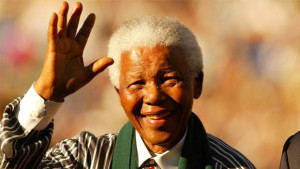Right now, the world is celebrating Nelson Mandela and learning from the way he lived his life.
 |
|
Photo by Domenico: CC BY-NC-SA |
In that spirit, we wanted to share with you a story about Mandela that you probably haven’t heard before. Goldman Prize winner Bobby Peek of groundWork (Friends of the Earth South Africa), who is a Global Greengrants’ Southern Africa grantmaking advisor and also former grantee, and the South Durban Community Environmental Alliance, also a Global Greengrants grantee, both shared this particular story in their written tributes to Nelson Mandela. We wish to do what we can to get this story out to a broader audience.
* * *
It was March 24, 1995. Nelson Mandela had been President for just under a year. That night, he was planning to speak at an event at the Engen Refinery in South Durban. As his motorcade drew close to the oil refinery’s gate, he saw a group of people protesting. He did not ask the driver to speed up, or to pull down the shades. Instead, he stopped his whole entourage. He got out of his car and said to his security team, “These are my people. Please stand aside. I want to listen to my people!”

|
| Nelson Mandela spontaneously speaks to protesters outside of the Engen Refinery |
Then, speaking directly to the people, he asked, “Why are you protesting?” It is not known exactly what the protestors told Mandela. Maybe they told him Engen spewed 60 tons of sulphur dioxide, a respiratory irritant, into the air every day, and their children were suffering from high levels of asthma. Maybe Bobby Peek, who was one of the protesters and whose house was located just behind the refinery, told him that Engen also emitted high levels of the cancer-causing chemical benzene, and that every family on his block had lost at least one member to cancer. Maybe they told them that Engen was planning to expand its operations, but was omitting the requisite pollution control technology from its plans because it would cost the company more money.
Whatever they said to Mandela, it moved him, because that same Friday night, he invited the protesters to meet with him and share their problems in more depth. After hearing them out, Mandela summoned his Minister of Health, Minister of Environmental Affairs, Deputy Minister of Environmental Affairs, Minister of Foreign Affairs, and CEOs and managers of Engen to a meeting just four days later. He insisted that Engen deal with its pollution problem. The group formed a committee to find solutions, and the committee then convened over six hundred of the most senior captains of industry in Durban, where community representatives were able to address them directly.
All of this led to an agreement between Engen Refinery and the communities of South Durban that reduced the sulphur dioxide pollution by 80%.
But it didn’t end there. The people in Mandela’s administration knew that the Engen Refinery was only one tiny part of a much bigger problem. Responsible environmental laws had to be adopted to regulate entire industries, not just one company. And so the government set about creating a set of laws that would protect people and the environment.
The resulting laws are not perfect, and their enforcement is even further from perfect. What is important about this story is the example it sets. Mandela stopped the motorcade, listened to his people, and acted on their concerns within a matter of hours. His government refused to see the protests merely as a PR problem which they could fix with a Band-Aid; they saw the issue as a symptom of a much larger problem, and sought to address the whole system for present and future generations.
We invite leaders and governments all over the world today to follow this example. May we not only celebrate Mandela’s leadership, and mourn its loss from the world, but learn from it.
For Bobby Peek’s complete tribute, click here.
The South Durban Community Environmental Alliance’s tribute is not yet available online. Much of the content in it can be found here.
